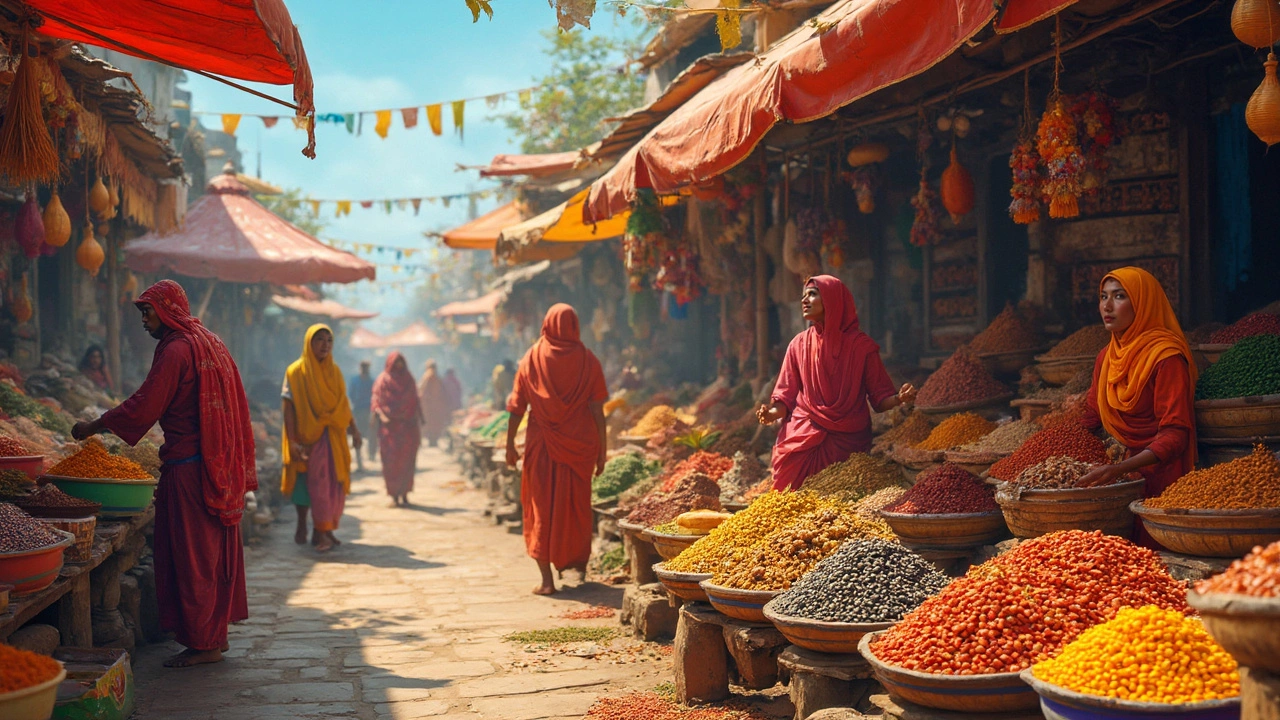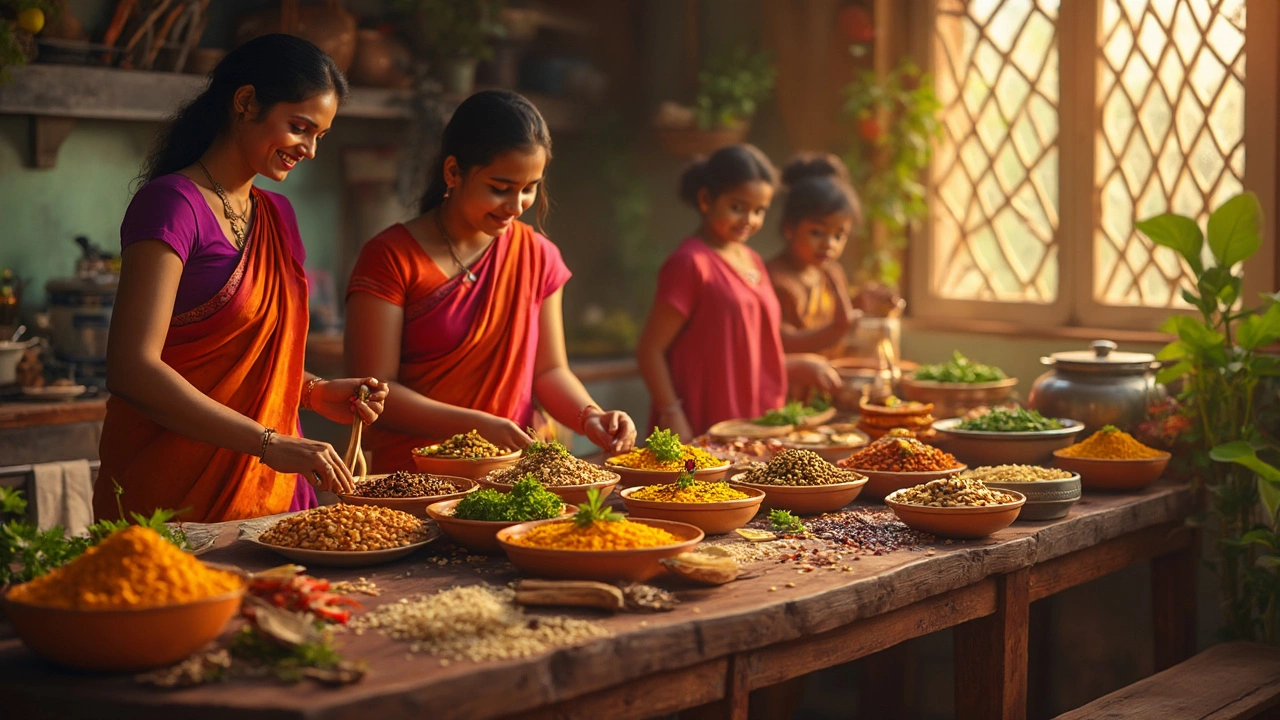Have you ever wondered if those delicious Indian vegetarian dishes include eggs? It's a common question, especially for anyone navigating Indian cuisine's wide variety. The simple answer is: usually, no. Indian vegetarian meals are traditionally egg-free, mainly because the concept of vegetarianism in India often aligns with lacto-vegetarian diets, which exclude eggs.
So, what's cooking in these hearty meals? Think lentils, beans, grains, and a colorful array of vegetables spiced to perfection. Sure, there might be exceptions in some regional or modern dishes, where a recipe could call for eggs, but culturally, it's not the norm. The love for paneer, ghee, and yogurt often makes eggs a non-essential ingredient.
- Eggs in Indian Cuisine
- Popular Vegetarian Dishes
- Tips for Egg-Free Cooking
- Cultural Perspectives on Eggs
Eggs in Indian Cuisine
Alright, let's crack open the topic of eggs in Indian food. Generally speaking, when people think of Indian cuisine, eggs probably aren't the first thing that comes to mind. But guess what? They're not completely absent either. While it's true that traditional vegetarian Indian dishes tend to skip the eggs, there are certain regions and recipes where eggs make a friendly guest appearance.
One place you'll commonly find eggs is in the realm of street food. Take the famous egg roll, for example, popular in places like Kolkata. It’s like a delicious wrap with an egg fried on top of a paratha, and it's a favorite right from the busy street markets to home kitchens. Eggs are also used in various forms in Andhra Pradesh, where spicy egg curries are quite the thing.
Usage of Eggs Across Regions
In some Southern states, eggs are often included in meals as a source of protein, especially in egg biryanis, egg dosas, or curries. This isn't the case across the board, though. Northern India, particularly among the Punjabi and Gujarati communities, tends to lean heavily into their legume and dairy-rich vegetarian dishes, leaving eggs out in most traditional recipes.
Why is that? Well, it's cultural and sometimes religious. Many Indians follow a lacto-vegetarian diet, which is connected to religious beliefs like Hinduism and Jainism where eggs are considered non-vegetarian.
Modern Influences
Indian cuisine, like any other, evolves over time. With the influence of global culture and urban lifestyles, eggs have found more acceptance in Indian cooking, especially among younger generations and non-vegetarians looking for quick protein-rich meals.
So, while eggs do have their spot in certain corners of Indian food lanes, the wonderful world of vegetarian Indian dishes remains predominantly an egg-free zone. It's this very diversity that makes Indian cuisine fascinating and deliciously complex.
Popular Vegetarian Dishes
Indian cuisine is a treasure trove of vegetarian delights. Whether you're a native or a curious foodie, there's something for everyone. These dishes are not just meals; they're experiences packed with spices and flavors. Let's dive into some of the favorites you can savor without worrying about eggs.
Aloo Gobi
A classic North Indian dish, Aloo Gobi brings together potatoes (aloo) and cauliflower (gobi) in a delightful mix of spices. It's a dry, mildly spiced dish, which perfectly complements Indian bread like roti or naan. Plus, it's naturally egg-free!
Chole Bhature
Chole Bhature is another beloved North Indian staple. This dish features spicy chickpeas (chole) served with deep-fried bread (bhature). It's an excellent example of how traditional Indian meals can be hearty, filling, and entirely vegetarian.
Paneer Tikka
For those who love a bit of grill and smoke, Paneer Tikka is the way to go. Soft cottage cheese is marinated in spices and grilled until it achieves the perfect char. It's a popular appetizer that can also double as a main course, often served with mint chutney.
Masoor Dal
Moving south, you can't ignore the comforting bowl of Masoor Dal. This red lentil soup is cooked with cumin, turmeric, and other spices, creating a wholesome and nutritious meal. It's simple to make and an excellent entry point into Indian cooking if you're trying this at home.
Palak Paneer
Imagine creamy spinach purée combined with soft cubes of paneer—it's as delicious as it sounds. Palak Paneer is not only popular in restaurants but also a standard part of many Indian households. It's rich in iron and protein, making it a healthy choice for anyone on a vegetarian diet.
- Pro Tip: To enhance the texture of these dishes, try using fresh ingredients, especially when it comes to paneer and spinach.
- Fun Fact: Some restaurants offer these dishes as 'thali,' serving a mix of these with rice and bread on a single platter, perfect for sampling different flavors.

Tips for Egg-Free Cooking
Going egg-free with Indian vegetarian dishes can be easier than you think. Here are some tips to keep your cooking authentic and close to traditional flavors without missing out on the magic of eggs.
Substitute Eggs with Ease
If a recipe calls for eggs as a binder or for moisture, there are plenty of alternatives. You can use ingredients like flaxseed soaked with water, mashed bananas, or applesauce. These work great for binding and adding moisture, ensuring you don't sacrifice taste or texture.
Explore Paneer and Tofu
For dishes where the texture is essential, paneer and tofu can be your best friends. They soak up flavors and provide that meaty bite often missed without eggs. Plus, they align perfectly with vegetarian Indian cuisine traditions.
Thicken with Chickpea Flour
Chickpea flour, or 'besan,' is a staple in Indian cooking and great for thickening without eggs. Use it in batter for fritters or even to thicken curries. It’s naturally rich in protein and adds a nutty flavor to the dish.
Embrace Yogurt and Buttermilk
Dairy plays a massive role in Indian cooking. Yogurt and buttermilk can help add fluffiness and body to dishes like batters and soups. They also add a tangy flavor that complements spices beautifully.
Consider Other Binders
There are plenty of options like potato starch, breadcrumbs, or mashed legumes to act as natural binders in your meals. These alternatives ensure you stick to traditional roots while keeping the recipe egg-free.
Mastering the Art of Indian Spices
Remember, Indian cooking thrives on spices. Whether you are whipping up a curry or a bread, using the right combination of spices can elevate any dish, making up for the absence of eggs. Experiment with combinations like cumin and coriander, or garam masala and turmeric for those rich flavors.
Cultural Perspectives on Eggs
The role of eggs in Indian food varies greatly, influenced by regional, religious, and dietary practices. In India, where a large portion of the population follows vegetarian diets, the inclusion of eggs can sometimes be a touchy subject. For many, especially within Hindu and Jain communities, vegetarianism is more than just a diet—it's a lifestyle choice reflective of cultural and spiritual beliefs.
In Hinduism, the concept of ahimsa, or non-violence, extends to dietary choices, often leading followers to exclude meat and eggs from their meals. Jainism takes this even further by avoiding root vegetables to prevent harm to the entire plant. This makes the concept of eggs in Indian cuisine not just about taste but also about ethics and beliefs.
Regional Differences
While North and West India tend to have widespread vegetarianism, you'll find some regions in South and East India, like Kerala and Bengal, where eggs might be more prevalent in day-to-day cooking. Yet, even here, it's essential to mention that these dishes are usually non-vegetarian categories and not in the vegetarian Indian dishes category.
It's worth noting that the growing global influence and dietary trends have introduced more egg-based recipes even in typical vegetarian fare, often resulting in fusion dishes. But traditional Indian vegetarian cooking largely stays eggs-free.
A Look at Some Numbers
Here’s a quick peek into how many Indians view eggs based on dietary habits:
| Dietary Preference | Percentage of Indian Population |
|---|---|
| Lacto-Vegetarian (No eggs) | 40% |
| Includes Eggs | 30% |
| Non-Vegetarian | 30% |
The numbers show that a considerable part of the Indian population adheres to an egg-free diet. This cultural standing significantly influences the culinary landscape in India, resulting in a rich tradition of egg-free yet flavor-packed cuisines.
